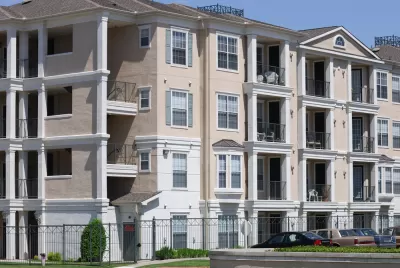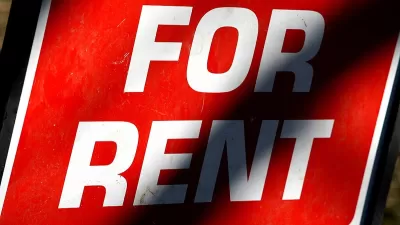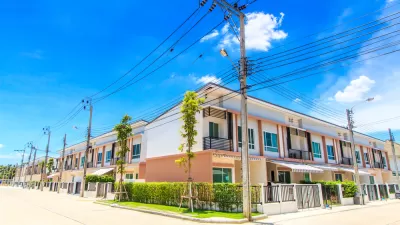Even with new funding proposed in the infrastructure package, voucher recipients face severe challenges in finding landlords that will accept them.

Among the proposed cuts to the proposed infrastructure spending package, reports Abby Vesoulis, is the $75 billion allocated for Housing Choice Vouchers. But even if the funding goes through, "the discussion underscores a central problem with the existing system: there’s a critical shortage of affordable housing units where people can actually use their vouchers."
Today, the program provides 2.3 million households with vouchers. "That’s nowhere near enough: only one in four people who qualify for federal housing assistance currently receive support, according to the left-leaning Center on Budget and Policy Priorities (CBPP), and those who do must wait an average of 2.5 years before receiving a voucher." While the new funding, if approved, would provide 750,000 additional vouchers, "a more systemic, and perhaps more intractable problem remains: once families get vouchers, they often struggle to find landlords who will accept them."
Some landlords "complain about the long lead times it takes between showing a tenant an available unit, going through the mandatory inspection process, making any needed repairs, and obtaining final PHA sign-off." If the vouchers were "a lot more like cash," they say, it would make the process easier for them.
Even so, "affordable housing advocates argue that more federal funding will at least begin to address some of the problems at hand," giving more families an opportunity to start looking for housing.

Alabama: Trump Terminates Settlements for Black Communities Harmed By Raw Sewage
Trump deemed the landmark civil rights agreement “illegal DEI and environmental justice policy.”

Study: Maui’s Plan to Convert Vacation Rentals to Long-Term Housing Could Cause Nearly $1 Billion Economic Loss
The plan would reduce visitor accommodation by 25% resulting in 1,900 jobs lost.

Why Should We Subsidize Public Transportation?
Many public transit agencies face financial stress due to rising costs, declining fare revenue, and declining subsidies. Transit advocates must provide a strong business case for increasing public transit funding.

Paris Bike Boom Leads to Steep Drop in Air Pollution
The French city’s air quality has improved dramatically in the past 20 years, coinciding with a growth in cycling.

Why Housing Costs More to Build in California Than in Texas
Hard costs like labor and materials combined with ‘soft’ costs such as permitting make building in the San Francisco Bay Area almost three times as costly as in Texas cities.

San Diego County Sees a Rise in Urban Coyotes
San Diego County experiences a rise in urban coyotes, as sightings become prevalent throughout its urban neighbourhoods and surrounding areas.
Urban Design for Planners 1: Software Tools
This six-course series explores essential urban design concepts using open source software and equips planners with the tools they need to participate fully in the urban design process.
Planning for Universal Design
Learn the tools for implementing Universal Design in planning regulations.
Smith Gee Studio
Alamo Area Metropolitan Planning Organization
City of Santa Clarita
Institute for Housing and Urban Development Studies (IHS)
City of Grandview
Harvard GSD Executive Education
Toledo-Lucas County Plan Commissions
Salt Lake City
NYU Wagner Graduate School of Public Service





























